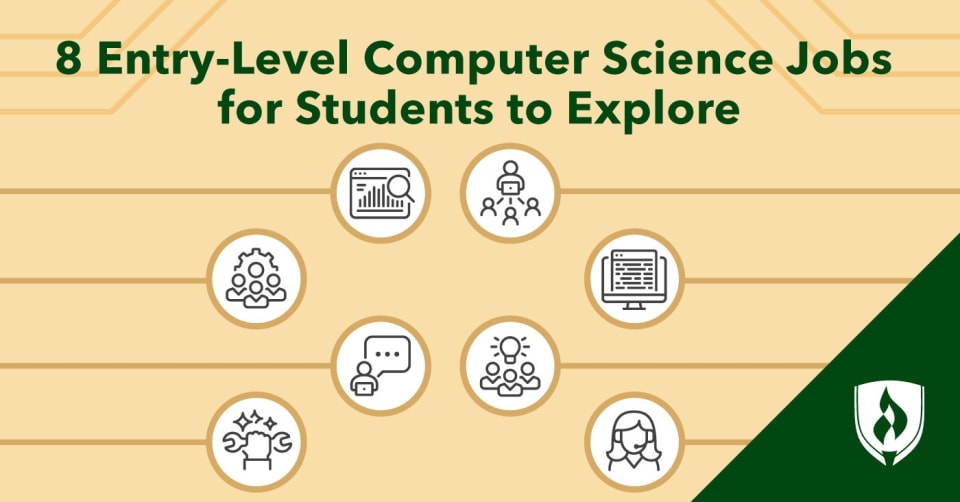
Every year, thousands of fresh college graduates grapple with a simple yet hugely important question, “What’s next?” If you’re seriously considering earning a Computer Science degree, you’re probably hoping to have an idea of the answer to that question before diving in.
The good news is that jobs in the computer and information technology industry are projected to grow much faster than average, according to the U.S. Bureau of Labor Statistics (BLS).1 As new devices come on the market and technology continues to evolve, companies across the globe are looking to hire graduates with a strong understanding of computer science.
If you’re curious about the entry-level computer science jobs that could be waiting for you after graduation, read on for a brief introduction to eight exciting options.
8 of the best computer science jobs for recent grads
One positive aspect about a computer science degree is its versatility. A computer science education can lay the foundation for pursuing several different technology careers. We’re profiling some of the most common opportunities so you can get a better understanding of the job duties, career outlooks and earning potentials. The BLS provides data on median annual earnings for these positions, but keep in mind that computer science starting salaries will likely be less than these benchmarks. Generally speaking, compensation tends to increase along with experience.
With that in mind, let’s take a closer look at the roles seeking computer science graduates. We used labor market analysis software to examine more than 135,000 job postings from the past year that were seeking candidates with a computer science degree and zero to two years of experience.2 Read on to learn more about these entry-level computer science jobs. Check out our article, "Pros Expose What Makes a Standout Computer Science Resume".
1. Software developer
Software developers analyze users’ needs and then design and develop software to meet those needs. In their work, they’ll collaborate with a team of developers to design and enhance a software program or application. These programs can range from practical, like an inventory tracking system, to fun, like a mobile game. This role requires strong programming and collaborative skills as the team works together to build and troubleshoot all elements of the program they’re tasked with creating.
- Projected employment growth (2019–2029): 22%1
2. Computer support specialist
Computer support specialists, sometimes called tech support or IT specialists, are tasked with answering questions from users about computer equipment or software. It’s their job to identify and solve software or hardware application problems in person, via phone or through email. They may also set up equipment, install programs and carry out minor repairs to hardware.
- Projected employment growth (2019–2029): 8%1
3. Web developer
Web developers design, build and maintain websites for clients and companies. Depending on the web development role, their work may focus on either the appearance and design of a website or the internal “back-end” code that ensures it works properly. They must work closely with the client or internal team to prioritize needs, develop content and identify solutions.
- Projected employment growth (2019–2029): 8%1
4. Computer systems analyst
Computer systems analysts are responsible for merging business and IT initiatives. They analyze data-processing problems to improve computer systems, enhance system compatibility and develop procedures and quality standards. They must also consult with business leaders to determine the role of the IT system.
- Projected employment growth (2019–2029): 7%1
5. Computer systems engineer
Computer systems engineers are tasked with creating solutions to complex applications problems, system administration issues or network concerns. They must connect and communicate with clients about system needs and collaborate with software developers to identify appropriate design solutions. They also provide advice on project costs, design concepts or design changes.
- Projected employment growth (2019–2029): 5%1
6. Information security analysts
Information security analysts spend their workdays planning, implementing, upgrading and monitoring security measures that are put in place to protect computer networks and information. This can include performing risk assessments, executing tests of data processing systems, documenting computer security policies and procedures, training users, and encrypting data transmissions to conceal confidential information.
- Projected employment growth (2019–2029): 31%1
7. Business intelligence analyst
Business intelligence analysts work to produce financial and market intelligence by analyzing competitive market strategies through examination of related product, market or share trends. They’ll often collect business intelligence data from available industry reports, public information, field reports or purchased sources. Armed with this intel, these tech pros identify industry or geographic trends paired with business implications.
- Projected employment growth (2019–2029): 8%1
8. Database administrator
Database administrators are responsible for overseeing the software and hardware that houses an organization’s data. This includes testing databases to identify and correct errors, coordinating and implementing security measures, specifying user access levels, and directing programmers and analysts to make system modifications.
- Projected employment growth (2019–2029): 10%1
Get your start in one of these entry-level computer science jobs
Now that you have a better understanding of some common entry-level jobs seeking computer science graduates, perhaps you’re starting to identify one or two that would be an ideal fit for you. The good news is there are several options out there for those equipped with a Computer Science degree.
Learn more about how our program can set you up for success in our article “8 Things You Didn’t Know About the Rasmussen University Computer Science Program.” Check out even more computer science career paths and what to expect.
1Bureau of Labor Statistics, U.S. Department of Labor, Occupational Employment Statistics, [accessed February 2021] www.bls.gov/oes/.
2Burning-Glass.com (analysis of 135,362 job postings seeking candidates with a computer science degree and 0-2 years of experience, Feb. 01, 2020 – Jan. 31, 2021).
EDITOR’S NOTE: This article was originally published in December 2014. It has since been updated to include information relevant to 2021.




